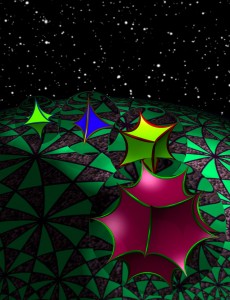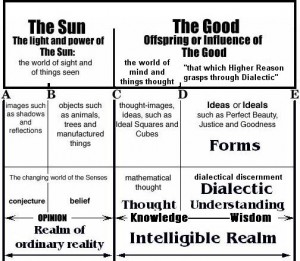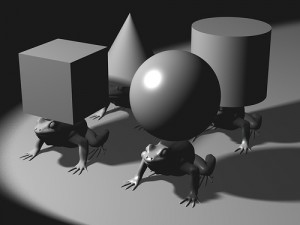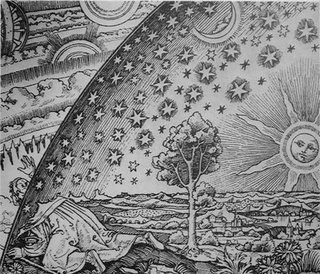Ong on Plato – As a Reactionary: Commentary 1
Commentary #1 ETEC540
Commentary 1 :Orality & Literacy: Ong on Plato – As a Reactionary

Above: Artist’s rendering of Platonic forms [retreived online Sept 2009]
Ong asserts, in his discussion [pp78-81] that Plato’s views about writing as expressed in the Phaedrus, demonstrate a reactionary response to the advent of writing, which was perceived by Plato as a threat to the primacy of orality and of the spoken word (Ong, 2002). Ong places Plato’s critique of writing along side similar critiques that have been issued by various figures over the course of the history of western culture during periods of technological transition. Ong mentions Hieronimo Squarcifico for example, who believed that the proliferation of books [circa 1477] was leading to a population that was less disciplined and less studious (Ong, ibid).
Resistance to technological change, and an investment in the status quo, were not the only characteristics of Plato’s views. According to Ong, quoting Havelock (1963) Plato’s entire epistemology “…was unwittingly a programmed rejection of the old oral, mobile, warm, personal interactive lifeworld of oral culture…” (Ong, ibid, pp79). He also states that Plato was “not at all fully aware of the…forces at work in his psyche to produce this reaction or overreaction…to lingering, retardant orality” (Ong, ibid, pp 80).
This discussion will explore some of the implications of Ong’s claims and examine the epistemological and philosophical underpinnings that provided support for Plato’s position. It will be shown that there was much more than just a resistance to a new technology, and a rejection of oral or written culture, involved in this critical stance about writing asserted by Plato. Plato’s denigration of writing and more generally about the role of art, was consistent with the ontological schema that supported his fundamentally mystical philosophical worldview.
A little background about the Phaedrus itself makes sense here. It is Plato’s famous work examining the nature of Love, through a dialogue purporting to be a discussion between Socrates and one of his colleagues Phaedrus. Important for our purposes here, it discusses some of the characteristics of writing and reveals also a critique of the role of artists [including poets] in society.
Ong lists four items that Plato suggests are wrong with writing; that writing is inhuman, that it destroys memory, that it lacks interactivity and that consequently it is passive. To understand why these characteristics and especially why interactivity was so critically important for Plato, it is necessary to understand the hierarchical nature of the Platonic world.
The highest discourse or reasoning procedure possible in pursuit of the ultimate virtue [Knowledge] is achieved through the interaction of oppositional pairs. Meaning is derived from the tension between two poles [one vs many, etc.] or is derived from the back and forth motion of thesis, ant-thesis and synthesis (Jones, 1970).

Ong fails to discuss the fundamentally mystical [not agnostic] philosophical system [The Forms, Hierarchy of Being] that supported Plato’s views. His hierarchical ontological schema [idealism] places man within a dualistic reality in which the world of sensory impressions [The World of Appearance] and observational data are not be trusted. That is, it is not the outside world [the world in which one makes scratches on paper or applies paint to canvas] that is the ‘essence’ of what it is to be human, nor, importantly, can one ever really know this outside world commonly referred to as ‘reality’. The ‘Essence’ of being, and the highest form of knowledge, can be apprehended through reason, it cannot be written down or ‘pictured’, made visible, etc.
Plato, using Socrates as his voice, sought a solution to the threat [as they both perceived it] of Sophist relativism, which they believed would lead to a society of moral anarchy. It was this perceived need to counter relativism that was largely responsible for Plato’s development of a rationalistic system and his concept of the Forms (Jones, 1970). Plato’s ideas about the nature of he Forms is complex, full exposition of the subject lies outside of the scope of this discussion.
However a brief synopsis of it is required to understand Plato’s hierarchical constructs of both reality and of the mind. Plato asserted that knowledge cannot be of nothing, of that which does not exist, and that real knowledge is eternally true and unchangeable. Therefore, the objects of knowledge, which he called Forms [or Ideas] must be eternal and unchangeable also. There is a form for every class of objects, [dog, table, beauty, god] and perceivable objects themselves are merely imperfect copies of the Forms.

The nature of reality that unfolds from these crucial assumptions is laid out in the” The Republic” in the metaphor of he Divided Line wherein reality is segmented into a dualistic schema, the Intelligible World and the World of Appearances.
Important to his construct of the mind is the hierarchical division of states of mind, thus, within the World of Appearances and at the base of the hierarchy is Imagining [including the production of art], which is the lowest form of cognition. Ascending ‘up’ to the next level is a better way of perceiving, the realm of Belief. Within the Intelligible World, the first level of the states of mind is Thinking, where the first type of real knowledge [mathematical knowledge] is attained. Finally as one ascends to the highest level to the realm of the Forms themselves, one has the potential to achieve true Knowledge [gnosis], arrived at through the employment of dialectic reasoning.

In summary, although Ong correctly notes some of the objections to writing made by Plato, he is not just another exemplar of a reactionary, as it relates to historical change nor in terms of an example of a simple or binary rejection of oral versus written culture.
Writing in the Platonic world, like art production, takes place in the world of appearances. Therefore, it can only be a pale copy, a transcription of the process, [later refined and expanded in the work of Kant] of dialectical reasoning. Plato’s views on writing were not merely a reaction or response to, a transition from orality to written culture but rather, a logical outcome of the profoundly complex views expounded in his philosophy.

References:
Ong, W.J. (2002) Orality and Literacy, New York, NY Routledge, Publishers
Pages 78 – 81 Plato, Writing and Computers
Plato, excerpt from Plato’s Phaedrus [retrieved online September 2009]
Jones, W.T. (1970) The Classical Mind: A history of Western Philosophy, New York: Harcourt Brace Jovanovich, Publishers


1 comment
1 Clare Roche { 11.28.09 at 6:07 pm }
I found your commentary to be very interesting.
You must log in to post a comment.